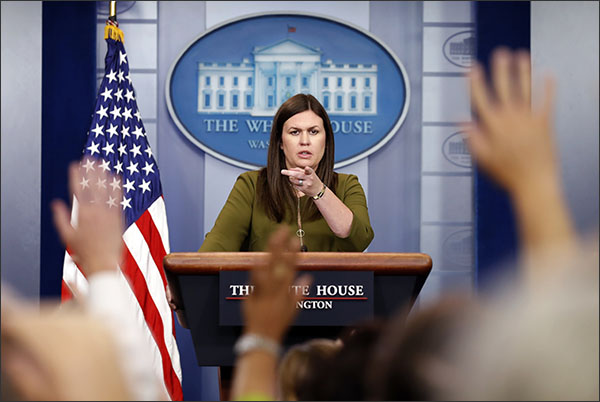White House Touts FCC Chair’s Plan to Scale Back Net Neutrality

The White House on Tuesday publicly endorsed the Federal Communications Commission chairman’s effort to roll back “net neutrality” policies — a step opposed by school organizations who fear it will stifle access to online academic content.
White House spokeswoman Sarah Huckabee Sanders told reporters at a press briefing that President Trump supports FCC Ajit Pai’s attempt to reverse policies adopted by the agency in 2015 on neutrality.
“We support the FCC chair’s efforts to review and consider rolling back these rules, and believe that the best way to get fair rules for everyone is for Congress to take action and create regulatory and economic certainty,” Sanders said.
Regulations approved two years ago under the direction of then-FCC Chairman Tom Wheeler, an Obama administration appointee, aimed to establish a framework for protecting net neutrality—basically, the concept that all internet traffic should be treated equally, without some content being assigned to fast lanes, other to slow lanes.
The FCC’s action two years ago reclassified broadband service as subject to regulations under Title II of the Communications Act and section 706 of the Telecommunications Act. The policy forbade internet providers from accelerating some content and slowing others.
Pai, a Republican Trump named as FCC chair, has argued that the policy amounts to over-regulation that discourages business innovation. He’s said that the fear of spawning fast and slow internet lanes amounts to”hypothetical harms and hysterical prophecies of doom.”
In May, the Pai-led FCC issued a notice of proposed rulemaking that would reverse the FCC’s decision two years ago and eliminate the Title II regulation on internet service providers. The notice promised to establish a “free and open Internet” through market-based policies that don’t rely on “utility-style” regulation.
Trump agrees with Pai’s approach, Sanders said, in a statement offered at the beginning of the briefing.
“The previous administration went about this the wrong way by imposing rules on ISPs through the FCC’s Title II rulemaking power,” Sanders said.
Sanders added that the White House “believes that rules of the road are important for everyone—web site providers, internet service providers, and consumers alike,” but that approach is not delivered through the Obama-era policy.
A number of school organizations and ed-tech groups argue that weakening net neutrality could result in telecoms giving preference to deep-pocketed providers of content, and that other content sought by K-12 educators would be relegated to slow lanes for delivery.
The State Educational Technology Directors Association last week reiterated its support for an advocacy campaign backing net neutrality, urging the FCC to stand up for “strong, unrestricted access to the internet.”
That position was shared by a group of library associations who recently submitted comments to the FCC. The groups plugged the FCC’s recent modernization of the E-rate program, which supports connectivity to the nation’s schools and libraries, and argued that scaling back net neutrality could scuttle those efforts.
“The modernization of the E-rate program has been a boon to public libraries and the communities they serve,” the library organizations said. “Doing away with strong, enforceable net neutrality protections may imperil that progress by making robust and affordable broadband even more difficult to attain,” the groups said.
Photo: Deputy White House press secretary Sarah Huckabee Sanders points to a questioner during an off-camera press briefing at the White House on July 18.–Alex Brandon/AP.
See also:
